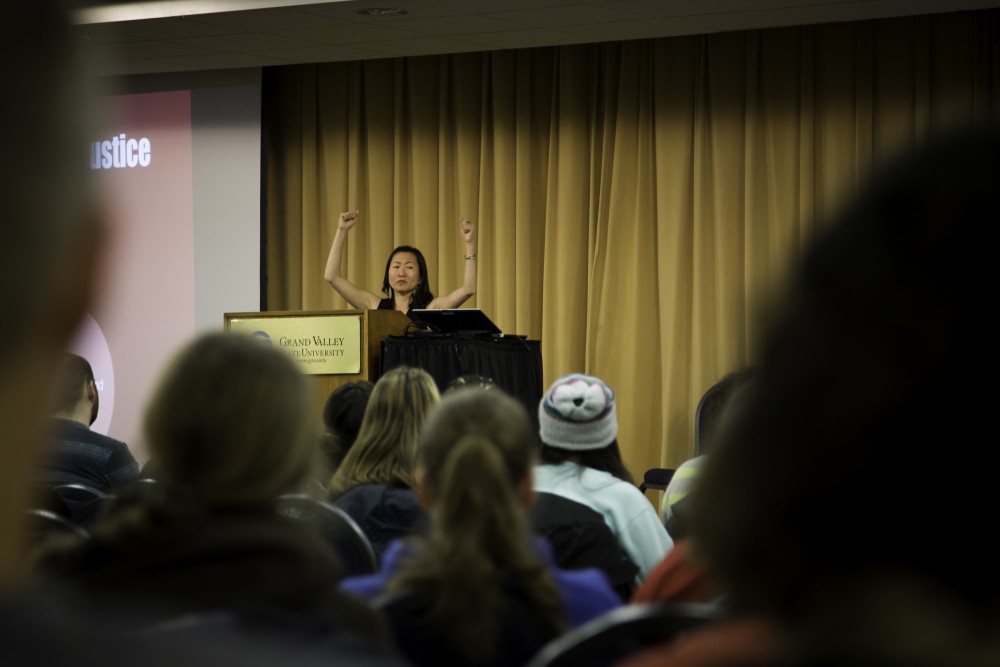Justice for all

GVL/Spencer Miller Mia Mingus
Feb 26, 2015
“No one is innocent,” said Mia Mingus, a writer, community educator and disability advocate. “Most of us have been part of harm even if we did not intend it.”
Mingus gave a presentation called “Building Bridges: An Introduction to Transformative Justice and Community Accountability” to a crowd of students and others at Grand Valley State University on Tuesday.
Her main point: the current strategies for preventing violence need improving. Her solution: transformative justice.
“This is real people’s lives we’re talking about,” Mingus said. “Transformative justice isn’t the case for most of our history. The reason why I do my work: the generations ahead of us. We have to keep moving forward.”
Our current criminal justice system primarily focuses on the individual, and rates of violence have not gone down despite the increasing prison populations. To remedy this, Mingus suggested creating a balance between the individual and the collective – the community.
“We need collective responses to violence because everyone created the conditions of society that allow violence to happen,” Mingus said. “We can all work together to transform the conditions. Don’t sacrifice individual justice for the collective. To have true individual justice, this can’t happen if you sacrifice collective justice and vice versa.”
Mingus mentioned poverty, colonization, white supremacy and patriarchy as examples of societal conditions that lead to violence, adding that people “can’t look at the incidences of violence in a vacuum.” Instead, they should be examined alongside the causes, she said.
Transformative justice also involves community accountability. Mingus explained that this means people should create and affirm their practices for preventing violence, provide a network of safety and support for survivors and commit to transforming the community.
“Community is not perfect,” she said. “…We want accountability in communities so accountability stops looking like punishment, like criminalization.”
In addition to collective and individual approaches, Mingus highlighted political and personal transformation as means to end violence. To illustrate this, she gave the example of working for an employer who does all kinds of good things for the community but is not a nice guy to work with.
“It’s not enough to stop the violence on the streets if we’re just going to go home and beat on each other,” Mingus said.
It not only takes individual transformation, but it also involves making changes in the larger politics and figuring out how to respond in a way that creates the least harm.
“State violence and intimate violence are deeply connected,” Mingus said. “They overlap; they depend on each other. We don’t talk enough about intimate violence, and we don’t help to encourage true accountability. Criminalization, rather than healing, allows more violence to happen.
“Part of this work is not just humanizing offenders, but getting rid of this cage around survivors. This (transformative justice) is the only way forward if we’re really talking about liberation.”
Sponsored by the Milton E. Ford LGBT Resource Center, the Women’s Center and the Office of Multicultural Affairs, Mingus spoke as part of an Intersections event called “Building Transformative Responses to Violence.”
Marlene Kowalski-Braun, assistant vice provost for Student Affairs, said she was excited to have Mingus on campus for the second time – the first being back in 2011, when she spoke during the Change U program.
Kowalski-Braun explained that Intersections was created to help the GVSU community understand how justice can be used as a tool that can make change.
“We are seeking to create a space for students to celebrate multiple identities,” she said. “It challenges us to change our language, how we interact with each other and our campus.”
Kristie Scanlon, assistant director for the Office of Multicultural Affairs, added that Mingus is working “for community and interdependency for all of us – not just some of us.”
For more information about Intersections, visit
www.gvsu.edu/intersections/. To read more from Mia Mingus, visit her blog at www.leavingevidence.wordpress.com/.






















